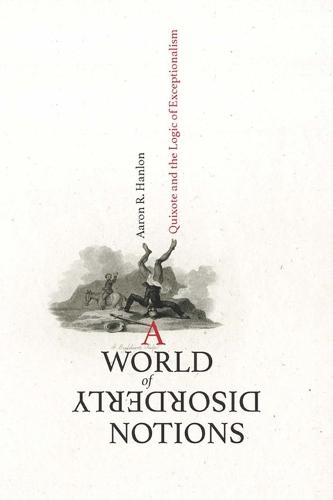Full Product Details
Author: Aaron R. Hanlon
Publisher: University of Virginia Press
Imprint: University of Virginia Press
Dimensions:
Width: 21.30cm
, Height: 1.70cm
, Length: 23.60cm
Weight: 0.469kg
ISBN: 9780813942162
ISBN 10: 0813942160
Pages: 232
Publication Date: 30 April 2019
Audience:
Professional and scholarly
,
Professional & Vocational
Format: Hardback
Publisher's Status: Active
Availability: In Print

This item will be ordered in for you from one of our suppliers. Upon receipt, we will promptly dispatch it out to you. For in store availability, please contact us.
Reviews
A World of Disorderly Notions is an original and substantial contribution to the study of quixotism in the eighteenth-century British and American novel. Hanlon argues that quixotism as exceptionalism is an ideology with an idealistic worldview to which everything must be assimilated. He succeeds admirably in providing fresh and stimulating new readings of quixotic works and in articulating a theoretical model that all other scholars in the field will have to take into account. --Catherine Jaffe, Texas State University, coeditor of Eve's Enlightenment: Women's Experience in Spain and Spanish America, 1726-1839 Quixotism has been haunting the novel, literature, and politics for centuries--its ubiquitous presence often noted but never actually explained. Aaron Hanlon is our ghostbuster, taking aim at the legion of quixotes with scholarship that materializes an intellectual consistency where none has been found. Animating the quixotic in all of its guises, argues Hanlon, is exceptionalism : a claim to act and be treated differently made by any entity--individual or nation state--that reasons from the exception rather than the example. It's this logic that empowers quixotes, making them not unique but self-replicating, and thus calling for Hanlon's remarkable intervention. --Clifford Siskin, New York University, author of System: The Shaping of Modern Knowledge As Hanlon shows, the quixotic mode was flexible enough to critique everything from shifting class alignments to revolutionary Jacobinism to nascent American nationalism. This study suggestively demonstrates the capaciousness of quixotism as a critical and satirical tool, while also modeling how one can analyze a work's cultural resonance beyond questions of simple influence. --CHOICE
A World of Disorderly Notions is an original and substantial contribution to the study of quixotism in the eighteenth-century British and American novel. Hanlon argues that quixotism as exceptionalism is an ideology with an idealistic worldview to which everything must be assimilated. He succeeds admirably in providing fresh and stimulating new readings of quixotic works and in articulating a theoretical model that all other scholars in the field will have to take into account. --Catherine Jaffe, Texas State University, coeditor of Eve's Enlightenment: Women's Experience in Spain and Spanish America, 1726-1839
""" A World of Disorderly Notions is an original and substantial contribution to the study of quixotism in the eighteenth-century British and American novel. Hanlon argues that quixotism as exceptionalism is an ideology with an idealistic worldview to which everything must be assimilated. He succeeds admirably in providing fresh and stimulating new readings of quixotic works and in articulating a theoretical model that all other scholars in the field will have to take into account."" --Catherine Jaffe, Texas State University, coeditor of Eve's Enlightenment: Women's Experience in Spain and Spanish America, 1726-1839 [O]ffers some of the most incisive recent criticism on the early history of the novel... Deserves a wide readership. -- ""Eighteenth-Century Fiction"" Ambitious in scope and cogent in argumentation, Aaron R. Hanion's A World of Disorderly Notions: Quixote and the Logic of Exceptionalism presents a timely new perspective on Miguel de Cervantes's much-studied knight errant and his particular quality of mind, namely, the irrational rationality which we recognize as quixotism. Across the book's eleven chapters, Hanlon provides an impressive reassessment of Quixote and the quixotic mindset, suiting effective literary criticism to important questions of the present historical moment. One of the best contributions to transatlantic eighteenth-century studies to appear within the last few years. --Timothy Ruppert, Slippery Rock University As Hanlon shows, the quixotic mode was flexible enough to critique everything from shifting class alignments to revolutionary Jacobinism to nascent American nationalism. This study suggestively demonstrates the capaciousness of quixotism as a critical and satirical tool, while also modeling how one can analyze a work's cultural resonance beyond questions of simple influence. -- ""CHOICE"" Quixotism has been haunting the novel, literature, and politics for centuries--its ubiquitous presence often noted but never actually explained. Aaron Hanlon is our ghostbuster, taking aim at the legion of quixotes with scholarship that materializes an ""intellectual consistency where none has been found."" Animating the quixotic in all of its guises, argues Hanlon, is ""exceptionalism"" a claim to act and be treated differently made by any entity--individual or nation state--that reasons from the ""exception rather than the example."" It's this logic that empowers quixotes, making them ""not unique but self-replicating,"" and thus calling for Hanlon's remarkable intervention. --Clifford Siskin, New York University, author of System: The Shaping of Modern Knowledge"
Author Information
Aaron R. Hanlon is Assistant Professor of English at Colby College.




